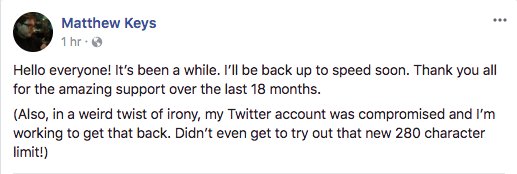Released from prison
Keys is released from the Satellite Prison Camp Atwater, in Atwater, California, after serving out most of his two-year sentence. He is living in a halfway house for two months as one of the conditions of his release.

9th Circuit: Keys’ guilty verdict and sentence to stand
The 9th US Circuit Court of Appeals rules (ruling) that it was not persuaded by arguments made by Keys’ defense attorney, saying that the damage went beyond the mere alteration, as Keys created new accounts, and there was a fervent effort to contain the defacement. Court:
Prior to Keys’s conduct, the CMS existed in a certain state of security. Keys made the CMS far weaker by taking and creating new user accounts. This manipulation of user accounts and login credentials (not Keys’s access) impaired the system.
Keys:
I am extremely disappointed in their decision. Until I have a chance to review their opinion, I will have no further comment.
Motion fails, must report to prison
The 9th US Circuit Court of Appeals announces that there is nothing novel about Keys’ conviction and that he is likely to lose on appeal. Therefore, the court rules (source), he should begin serving his time even while his appeal is pending.
Appellant has not shown that the appeal raises a “substantial question” of law or fact that is “fairly debatable,” and that “if that substantial question is determined favorably to defendant on appeal, that decision is likely to result in reversal or an order for a new trial of all counts on which imprisonment has been imposed,” or a sentence that does not include a term of imprisonment, or a reduced sentence to a term of imprisonment less than the total of the time already served plus the expected duration of the appeal process.
Not sure when I'll have to go in. I'll keep you all posted. Short of a presidential commutation, nothing else we can do.
— Matthew Keys (@MatthewKeysLive) July 22, 2016
Files appeal, stays out of prison
Keys’ lawyers file an emergency motion with the 9th Circuit Court of Appeals (source), allowing Keys to stay out of prison. The request is filed just hours after the federal judge who presided over Keys’ trial and sentencing, US District Judge Mueller denied a similar motion for release pending appeal. Keys’ defense attorney says that because the defacement that occurred at the Times was ultimately corrected from a backup, no damage was actually inflicted.
The damage minimum is a jurisdictional requirement of a CFAA charge. Without damage, there can be no conviction. Courts across the country have denied damage findings even in more extreme cases where files were deleted but recoverable.
An automatic stay has issued in the @MatthewKeysLive case. He will not be reporting to prison today.
— Jay Leiderman (@JayLeidermanLaw) June 15, 2016
Receives two year sentence
Judge Mueller sentences Keys to 24 months in prison, with 24 months supervised release following. The judge limits the amount of loss (for purposes of sentencing) to whatever had been presented at trial, determining that the appropriate range for sentencing was between 37 and 46 month Her final judgement, considering mitigating factors such as Keys’s otherwise clean record, his history of complying with law enforcement, and the unlikeliness that he would reoffend, is lower than her own recommendation. Mueller:
I think the parties agree, it’s not the crime of the century. [The effect of the defacement was] relatively modest and did not do much to actually damage the reputation of that publication [but that she could not ignore that his] intent was to wreak further damage which could have had further consequences…The mask that Mr. Keys put on appeared to allow a heartless character to utter lines that are unbecoming of the professional journalist that he holds himself to be, and is, in most respects, in fact.
Keys:
[W]e’re not only going to work to reverse the conviction but try to change this absurd computer law, as best we can.
Prosecution:
Those who use the internet to carry out personal vendettas against former employers should know that there are consequences for such conduct.
Keys is to surrender to a facility—likely a prison in Lompoc, California—on June 15. His defense says it is planning an appeal.
Lawyers want no prison time
Keys’ defense lawyers file a 69-page sentencing memorandum, asking the court to impose no prison time at all or go with a “non-custodial sentence.” The filing goes to great lengths to illustrate Keys lengthy history in journalism, going way back to his elementary school days when he edited the school bulletin.
In recent years, Matthew’s sacrifices have paid off in the form of impactful journalism that has received national attention. His stories have encouraged discourse, influenced policy and won the attention and accolades from his peers in the industry, public interest groups and even law enforcement officials…[Keys] faces a far more severe sentence than any member of Lulzsec served. 60 months, which the Government seeks, would be more than any person engaged in hacking crimes during this period—by about double!
[scribd id=306676364 key=key-z4pmSoh7iHE0f46obTJo mode=scroll]
Prosecutors seek five years
In a 12-page sentencing briefing, Federal prosecutors ask a judge to impose a sentence of five years against Keys. Prosecutors say:
[Keys’ attack was ] an online version of urging a mob to smash the presses for publishing an unpopular story. [He employed] means that challenge core values of American democracy.
[scribd id=306676159 key=key-SM73NMhSj6fxrBWZdNSK mode=scroll]
Protests sentencing recommendations
Keys lawyers say that that the pre-sentencing guidelines presented to the court by a probation officer miscalculated the losses to the Times as a result of the Anonymous hack, resulting in an overly harsh potential sentence. Their argument notes that revenge porn pioneer Hunter Moore received only 2.5 years for “far worse and far more harmful behavior” than Keys’. The lawyers also say that the sentencing guidelines have little to do with the Computer Fraud and Abuse Act. He was not charged, nor was he convicted of, unauthorized access to a computer and obtaining information, but actually charged with ‘“know[ing].. transmission of a program, information, code, or command, [the result of which] intentionally causes damage without authorization to a protected computer.”
Imposing a sentence of over seven years and roughly $250,000 in speculative restitution is a draconian sentence for a minor occurrence that could have been more appropriately handled by a civil lawsuit instead of three federal felony criminal convictions.
Found guilty
 A jury of 11 women and 1 man find Keys guilty on all three counts: conspiracy to commit computer hacking, transmission of malicious code causing unauthorized damage to a protected computer, and attempting to transmit malicious code to cause unauthorized damage to a protected computer. He faces a maximum of 25 years and will be sentenced on Jan 20, 2016. His lawyers say he will appeal. FBI:
A jury of 11 women and 1 man find Keys guilty on all three counts: conspiracy to commit computer hacking, transmission of malicious code causing unauthorized damage to a protected computer, and attempting to transmit malicious code to cause unauthorized damage to a protected computer. He faces a maximum of 25 years and will be sentenced on Jan 20, 2016. His lawyers say he will appeal. FBI:
This case demonstrates the FBI’s commitment to identify and investigate those who harass former employers by using insider knowledge to intentionally exploit computer systems—whether directly or by proxy—to damage the reputation and operations of a business. Individuals who use ‘bully’ tactics to attack computer networks will face justice for their actions.
Keys:
The government wanted to send a clear message that if you want to cover a group they don’t agree with, and you’re not complicit with them [the government], they will target you.
That was bullshit.
— Matthew Keys (@MatthewKeysLive) October 7, 2015
Trial starts
During opening arguments, Keys lawyer tells the jury his client is not guilty because he neither intended to cause damage, nor actually caused the amount of damage that the government alleges. The defense argues that Keys was in the Anonymous IRC channel as a journalist, looking to write up a “headline-grabbing story” about Anonymous. His lawyers say a major issue is whether Key’s actions were “low-level vandalism, or high-level, high-damage hacking,” and note the defaced article was changed back in an hour.
Matthew Keys did not know as much as the government says he knew. He did not know the true capabilities of the others in the chatroom with him.
Prosecutors claim that the Tribune spent over $5,000 to fix the defacement. They claims to have a recording of Keys confessing, “I did it,” as well as a written confession.
This is a case about online anonymous revenge.
Charged
Department of Justice charges Keys in connection with the attack. He faces three counts: conspiracy to transmit information to damage a protected computer, transmitting information to damage a protected computer, and attempted transmission of information to damage a protected computer. The two substantive counts carry a maximum penalty of 10 years in prison, three years of supervised release and a fine of $250,000. The conspiracy count carries a maximum penalty of five years in prison, three years of supervised release and a fine of $250,000. Reuters, his current employer:
Any legal violations, or failures to comply with the company’s own strict set of principles and standards, can result in disciplinary action. We would also observe the indictment alleges the conduct occurred in December 2010; Mr. Keys joined Reuters in 2012, and while investigations continue we will have no further comment.
[scribd id=284006482 key=key-OxWUOCAQhApYfpk92FRm mode=scroll]
FBI visit
Keys is visited by the FBI, who show him a search warrant with 50 pages of chat transcripts. They interview him on his bed, in his pyjamas. He writes a confession for both the Cancerman emails and the LA Times defacement.
I am extremely remorseful for both actions, and am fully willing to cooperate with any agency on this or any other matters, and cooperate now and in the foreseeable future.
